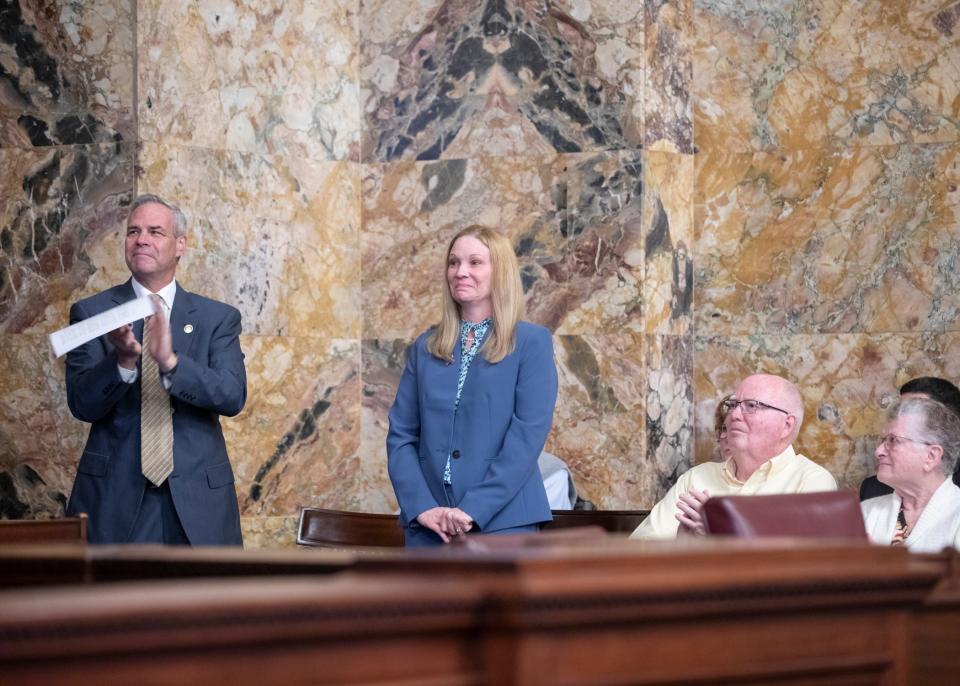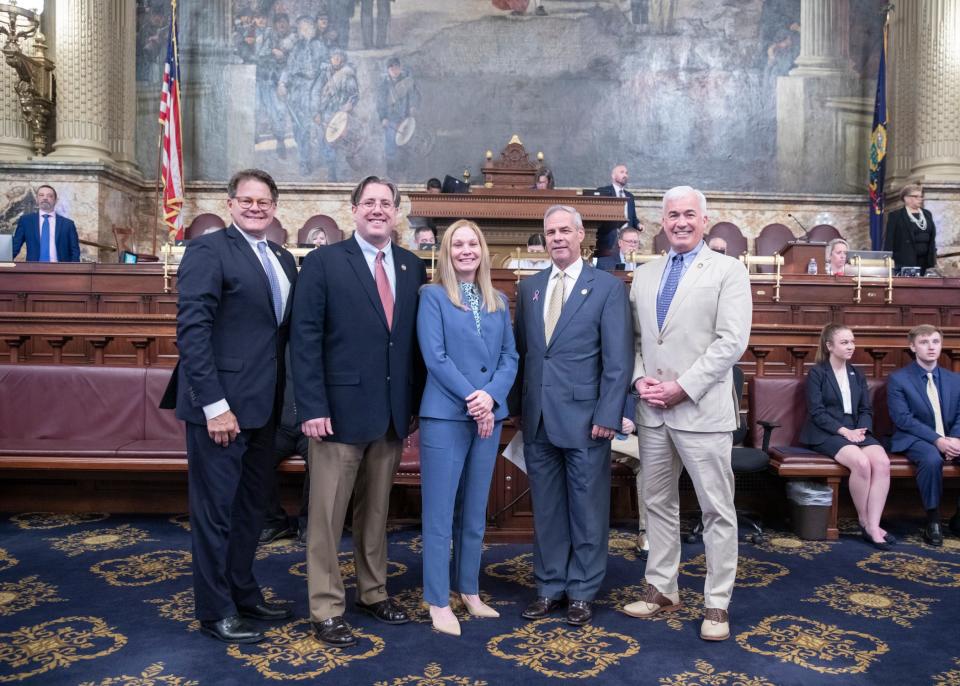Heidi Edwards lost her family to this rare genetic disease. Now she's fighting back
- Oops!Something went wrong.Please try again later.
North Lebanon Township resident Heidi Edwards has seen her family devastated by the rare genetic disease ALSP over the last 20 years. Since 2020, she's dedicated her time to building a now global nonprofit working towards a cure and bringing a community together.
"I don't have my mom, I don't have my two sisters, I'm now an only child. I'm losing everyone to this devastating disease, so I'm taking in my community as if they're my family and trying to save them from the devastations of this disease," she said.
Adult-onset leukoencephalopathy with axonal spheroids and pigmented glia, or ALSP, is a rare hereditary disease, often misdiagnosed because its symptoms are commonly associated with other diseases such as Parkinson's disease or multiple sclerosis.
Symptoms can include a decline in mobility, muscle spasms, a reduced feeling of pain and psychological changes. ALSP often does not present itself until people enter their 40s and have already passed the affected gene to their children. ALSP has no cure.
That why Edwards was grateful when on Wednesday, May 8, the Pennsylvania House of Representatives passed House Resolution 251, designating May 2024 as ALSP Awareness Month in Pennsylvania.

Around 20 years ago, Edwards lost her aunt to ASLP, but at the time they did not know that it was ALSP; she was diagnosed with a different disease. Soon after, Edwards' mother began showing similar symptoms, and the doctors made the connection that it was likely genetic.
During the final stages of her mother's illness, Edwards' uncle began to experience symptoms as well.
"When my mom passed away in 2012, we still didn't know what gene caused our disease, but we knew it was probably a leukodystrophy, and it causes movement and memory issues. Soon after my mom passed away, her brother passed away and at that time at the Mayo Clinic in Jacksonville, Florida, they had discovered this mutation, the CSF1R mutation, which causes ALSP."
The University of Pennsylvania checked the donated brain tissue from all three of Edwards' family members and discovered that they all carried the mutation. In 2014, her family attended a group meeting with physicians at the University of Pennsylvania to discuss the disease, what it meant for the family, and the option for them to have predictive genetic testing done.
While the disease is extremely rare and often misidentified, there's a 50% chance that someone with the mutation passes it down to offspring.
Because of how recently the mutation was identified, Edwards explained that there are many doctors out there who aren't aware of exactly what ASLP is, and fewer who can treat it.
Edwards decided to get the genetic testing done, which determined that she did not carry the gene. Her sisters, however, opted not to have the testing done.
Sisters' Hope
"Because there was no cure or treatment, and it's a really horrible way to die. It's like dying from ALS, or Huntington's Disease, and Alzheimer's Disease. So my sisters said, there's nothing that can be done for us, we're just going to live our life as if nothing has happened."
By 2019, both of her sisters became symptomatic.
In 2020, her sisters were notified that they could take part in an experimental bone marrow transplant in Minnesota. Edwards volunteered and found out that she was a 100% match with her sister Heather, and 15 days after the transplant, Heather suffered cardiac arrest and was admitted to the ICU.
Around that time, Edwards decided that she needed to do something and founded Sisters' Hope Foundation named in honor and memory of both of her sisters.
"Heather passed away in August of 2020 in Minnesota," she said. "Holly came home after all of her baseline testing and deciding that she was not staying in Minnesota, she came home and lived out 10 more months with us here in Lebanon County, with her son, lived out those days with us, and passed away in July of 2021."
Soon after, Edwards' nephew underwent the genetic testing and tested positive for the gene mutation.
Caring for someone with the disease is extremely difficult, she explained. There is no normal or constant, as it can progress rapidly compared to a disease like Alzheimer's. In her family's case, like many others, those with ALSP may only live 2-3 years after becoming symptomatic.
"I wouldn't trade it for the world, honestly," she said. "But it's the hardest job I've ever had. I helped care for my mom, I helped care for my older sister Heather, and then Holly, my twin sister, she was a single mom. Her and her son had to come live with me."
Knowing that it was going to be hard on everyone, Edwards tried to make the best of every moment for Holly, her nephew and her family by going on as many trips and making as many memories as time would allow.
Sisters' Hope Foundation, a nonprofit dedicated to the patients of ALSP around the world with the goal of increasing awareness and understanding of the disease, supports people living or caring for people living with the disease and creating connections for the ALSP community.
The foundation started out as a small family foundation and has since grown to reach carriers of the gene around the world.
She sees the community that she's brought together as her family. When they meet on a yearly basis for a conference, they treat each other with the same affection and gratitude that a family would.
Their overall mission is to one day see the first survivor of ALSP.
The foundation works directly with biotech companies and academic researchers looking to find a cure for ALSP. Additionally, they work as a recourse for patients and families of patients with the disease, connecting them not only to resources, but with each other.
In one case, a treatment for the disease is showing promising results and is currently in a phase two clinical trial. It's currently the only option available that may become FDA approved, Edwards said.

PA House resolution
The resolution, co-sponsored by Reps. John Schlegel (Lebanon), Tim Brennan (Bucks) Jamie Barton (Berks, Schuylkill) and Tim Twardzik (Schuylkill), aims to raise awareness of both ALSP as well as Sisters' Hope Foundation.
"It's like I always say to my colleagues," said Schlegel, "these are incurable diseases and if there's something that we can do to participate in the process of raising the level of awareness that's going to lead to a cure, I think we can all agree that that's a good thing."
Schlegel believes that passing the resolution, along with the passing of a similar resolution last month for retinal blindness, can carve a path for further opportunities to raise awareness of these incurable diseases.
The resolution is much in line with the foundation's major strategic priority for the year: education. By raising awareness of the disease, they hope that more patients can be identified and can receive help earlier on.
Edwards said that Brennan, who grew up with Edwards and her sisters in Schuylkill County, was instrumental in organizing the House resolution and getting others to cosponsor it.
"When they passed away (her sisters), he became involved with the foundation and stayed in touch with me," Edwards said. "When he saw that I was doing different things, I have a proclamation from the Governor one year, and I go to rare disease week on capitol hill, he started asking me about a House resolution in Pennsylvania."
Edwards attended the adoption of the resolution, which passed in a 199-1 vote, and said that she felt honored that both her family and the foundation were being recognized.
"We were fortunate that everything kind of came into place. The resolution passed, as I figured it would, on a bipartisan basis..." said Schlegel. "Heidi was there as a guest of ours. She was on the House floor and she could watch as the resolution was brought up for a vote. She heard the comments that we made as representatives and when she left that day she left with the resolution."
Daniel Larlham Jr. is a reporter for the Lebanon Daily News. Reach him at DLarlham@LDNews.com or on X @djlarlham.
This article originally appeared on Lebanon Daily News: Lebanon PA based foundation works to fight against ALSP

